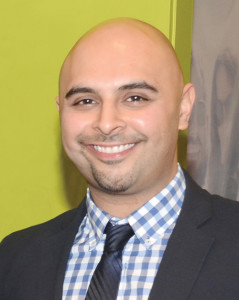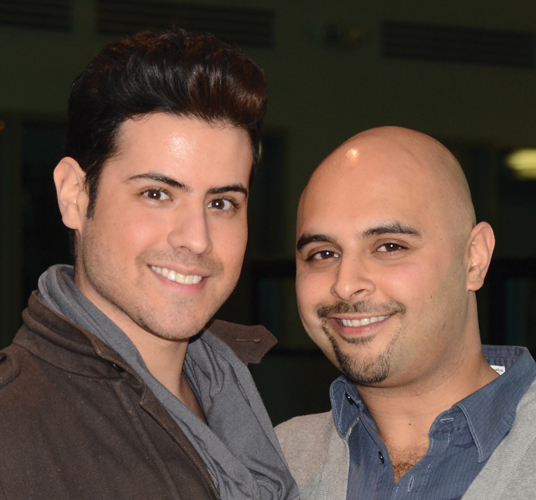
Reconciliation

A man’s struggle to unite Islam and homosexuality
by Sadiq Ali Sheraze
Photo by Dalton DeHart
I’ll spare everyone the lengthy details of my coming-out story, but to sum it up, being a gay man in my family is no cakewalk. I imagine my story is similar to so many brave gay men and women who paved the way before me, the only difference being that I was born into a religious Muslim family in the heart of the Lone Star State. There have always been a number of challenges I have had to face being raised Muslim; however, the most difficult of them was attempting to reconcile the religion I was so zealously raised in with that of my innate sexuality. As global conditions bring Muslims into the forefront of political headlines, and with all of the legislation being adopted to recognize gay rights, I’d like to share what it means to be gay and Muslim in the world we live in today.
Growing up in a city about twenty-five miles north of Houston, where the only Muslims I knew were my family and a homosexual community was nonexistent, I didn’t have much to relate to in terms of fitting in. It was complicated trying to make friends when our religious customs were so different from everyone else’s. Many of the women in my family wore the traditional hijab veil, and during certain religious holidays we were obligated to wear cultural attire that would always turn heads. We were not allowed to date, even though all of our classmates had girlfriends and boyfriends (though this was always a great excuse for me to avoid dating girls). Moreover, while most kids were celebrating Easter and Christmas, I was busy defending my religion by explaining why we fast for one month out of the year or why we pray five times a day.
Interestingly, as I assimilated into American life, I found that I also had to defend my Western customs to my parents—such as why we had non-segregated school dances or why sleepovers were things kids did for fun. As an adult, I still have to explain certain aspects of Western culture to them, like why Lady Gaga wore a dress made of meat to an awards ceremony or why moving in with a significant other before marriage is the norm. Of course, cohabitation is not a huge issue for my parents because according to Islam, homosexuality is a sin and marrying my partner of six years would never be accepted. You could move mountains more easily than you could rationalize homosexuality to someone who believes so fervently in the literal words of Holy Scripture.

This dichotomy has always existed between my religious upbringing and my unfolding life. Nonetheless, I found it necessary to reconcile Islam, despite its interpretation on homosexuality, with the truth of my own sexuality. In order to truly know myself, I had to understand both sides and find a way to reconcile the differences.
Ironically, it was during my undergraduate career at Baylor, a conservative Baptist university, that I developed a deeper understanding of Islam. It was also where I found the courage to come out of the closet, although not all simultaneously. I joined the Muslim Student Association on campus, and for the first time in my life formed a strong community with other Muslim students. Although I was still in the closet, I had found a group I could relate to, that also understood the challenges of being raised as first-generation Americans. It was through these friendships that I learned how to understand Islam on a personal level, without falling victim to its interpretative meanings.
Not long after, a group of students developed “Baylor Freedom,” an unofficial school organization that was prohibited because they were not in tune with Baptist principles. It was through Baylor Freedom that I could share my story with other gay individuals from various faiths. I spent many nights praying for resolution, but it was ultimately in the values of my own religious beliefs where I found the courage to be honest about who I am. Despite the taboo of being openly gay in the Muslim community—something that is punishable by death in certain parts of the Muslim world—I decided to come out to my family and friends.
Ultimately, it was in the unwavering friendships I developed within the gay community that I found the true reconciliation between my religion and my sexuality. The love and honesty I developed in my relationship to my partner strengthened my understanding of both life and religion. Islam had taught me the theoretical concepts of discipline, truth, and goodness, but it was my relationships with my partner and friends that allowed me to practice the concepts I was taught since I was young.
Although it was a challenge uniting the many aspects of my life, I have discovered the courage that lets me go against the grain. On my path toward reconciliation, I found what is truly important in my life, and that is to accept all of humanity, regardless of religion or sexuality. It is exhilarating to be a part of this moment in history. I am proud of the progress our country is making in the gay rights movement. It is our obligation to pave the way for all the closeted boys and girls growing up today. It is essential for us to speak out against hate, regardless of what form it takes. It is my responsibility to be a voice for those in the Muslim community who have their own difficulties reconciling their faith with their sexuality. It is just as important for me to proudly identify myself as a Muslim American and break any stereotypes that people have toward Islam. I do not consider myself traditionally religious, but I cannot deny that being raised Muslim is a significant aspect of who I have become.










